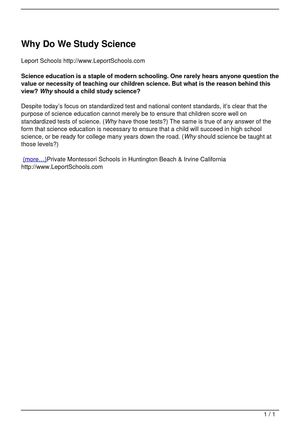Why Do We Study Science in School?

Science teaches us how the earth works. It teaches us about the depletion of natural resources and the effect these changes have on living things. It teaches us the importance of conservation of natural resources and wildlife, as well as how to avoid and cope with natural disasters. Science provides practical knowledge that will serve us throughout our lives. Knowledge about natural disasters, conservation, and survival skills are invaluable assets that we can use in our personal and professional lives.
Humanistic approach
A Humanistic approach to studying science in school aims to foster student creativity and critical thinking. It emphasizes a student’s individuality and personal values over externally imposed standards. A humanistic approach also emphasizes choice-based learning and requires students to cite scholarly sources in their essays. For example, humanistic educators advocate a “self-evaluation system,” where students can evaluate their own learning, as opposed to the teacher’s.
The Humanistic approach focuses on the individual and the environment in which they learn. Humanistic educators aim to create an environment where students are safe and can make their own decisions and set their own goals. Humanistic educators believe that students must be motivated and engaged in the process of learning, so they should be able to make their own decisions. This approach has also been proven effective in fostering the growth of students, who become more critical thinkers and better communicate with others.
Career opportunities
Aside from the many opportunities that are currently available in the field of medicine, students who study science in school can also pursue other fields. Whether it is robotics, engineering, or medical science, there are many other options that are available through science. Depending on your interests, you can also pursue a Bachelor of Arts, or a Bachelor of Science. After graduation, you can continue your studies with a Master of Science or PhD.
Science is not only about physics, chemistry, and biology; it also encompasses genetics, geology, maths, nanotechnology, and zoology. The field is constantly evolving, and there are now jobs in science that were unthinkable just twenty years ago. Some of these positions include biotechnology, drones, smart devices, and data analysis. Students can also choose to specialize in one particular area, like biotechnology, chemistry, or engineering.
Building generational wealth
Building generational wealth is about more than financial assets. Winning a big lottery or investing in a successful business will not necessarily provide lasting wealth to the next generation. Educating oneself in the basics of financial education and utilizing a portfolio can help establish a strong foundation for long-term wealth. Building generational wealth by studying science in school can help make the process more straightforward and enjoyable. There are several important aspects of building generational wealth.
Generally, generational wealth is the accumulation of valuable assets by generations. Such assets include real estate, stocks, life insurance benefits, trust fund accounts, and family businesses. Inheriting such wealth allows the person to have a substantial financial advantage over their family members. The wealth can be used for various goals including income-generating investments or purchasing one’s first home. The benefits of building generational wealth can be enormous.
Ending cycles of poverty
The most powerful weapon against poverty is education. Children who are not in school are more likely to become victims of exploitation and early marriage. They are also on track to have lower incomes as adults. Without basic education, they are unable to achieve their full potential and limit the future of their children. Ending cycles of poverty with science in school can help break this cycle. Children need the tools to succeed in life, and the power of science can help them succeed.
In 2015, the United Nations signed the Sustainable Development Goals (SDGs) to help address global poverty. The goals define poverty as a combination of social, economic, and environmental factors. When children learn the principles of scientific research, they will be better prepared for a wide range of careers. The benefits of STEM education extend far beyond the STEM fields. Science education can be a pathway to a higher paying job in almost every field.